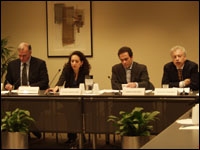Registration
You will receive an email confirming your registration.
Presenters:
Nathan Brown, Senior Associate, Carnegie Endowment, and Professor, George Washington University “Pushing Toward Party Politics? Kuwait's Islamic Constitutional Movement”
Amr Hamzawy, Senior Associate, Carnegie Endowment
Morocco's Party of Justice and Development (Paper forthcoming).
Discussant:
Leslie Campbell, Regional Director for the Middle East and North Africa, National Democratic Institute
Moderator:
Julia Choucair, Deputy Editor, Arab Reform Bulletin, and Associate, Carnegie Endowment
IMGXYZ651IMGZYXNathan Brown presented his paper on Kuwait’s Islamic Constitutional Movement (ICM). The paper is part of series of case studies on Islamist movements in Arab countries. Brown argued that, like many of its counterparts in the Arab world, the ICM emerged primarily as a social movement, with its involvement in politics being secondary. It is precisely the ICM’s identity as a social movement which contributed to its political success. Despite its long history of political participation, however, the ICM often finds itself accused of being too radical by some and co-opted by others. Yet a distinctive feature of the ICM is the degree to which it is integrated in Kuwait’s political space. Brown identified four factors that contribute to this integration: the clear distinction between party and social movement; the dominance of the party’s leadership; a political environment that includes potential partners; and the fact the ICM has been able to focus more on domestic issues than on the regional issues that sometimes dominate the agendas of other Islamist movements. The current political situation in Kuwait, characterized by an opposition-dominated parliament, presents an opportunity for the Kuwaiti opposition to press for further reform. Success, however, is largely dependent on whether the historically disunited and very diverse opposition will be able to maintain unity.
Amr Hamzawy highlighted two distinct features of Morocco’s Justice and Development Party (PJD). First, the party does not have strong ties with its Egyptian parent movement, the Muslim Brotherhood. Second, the PJD operates within a pluralist Islamist spectrum, which includes other actors, such as al-Adl wal-Ihsan (Justice and Benevolence), a social movement that refuses to participate in elections but that maintains a larger popular following than the PJD. The PJD has placed a high premium on political participation since its inception, and has sought to demonstrate pragmatism and respect for a regime-defined political game. The PJD has also moved in the direction of prioritizing political reform issues at the expense of its social, cultural, and religious agenda. Despite this, the party’s political viability continues to be challenged. On the one hand, the persistence of semi-authoritarian features in Morocco’s political system places several structural constraints on the party’s ability to push for greater political openings. On the other hand, the great polarization in Moroccan society along secular and religious lines raises suspicions of the party’s motives. The PJD’s changing relationship with the monarchy places further constraints on the party; although tolerant of the PJD’s political participation, the royal palace remains cautious, especially with regards to the party’s participation in government.
Leslie Campbell discussed three themes emerging from the two case studies: the degree to which a culture of democracy can influence the political participation of Islamist movements; the extent to which these Islamist parties are co-opted by ruling regimes; and whether their political participation in fact leads to ideological moderation. He suggested that political participation often leads Islamist political actors to become more pragmatic.
During the question and answer period, Hamzawy observed that the size of the PJD’s constituency remains ambiguous at best, and that the party largely draws on middle-class urban Moroccans. The pluralist Islamist spectrum in Morocco requires the PJD, unlike many of its regional counterparts, to compete with other actors—including the monarchy—who claim to derive their legitimacy from religion.
Synopsis prepared by Dina Bishara, research assistant for the Middle East Program.
